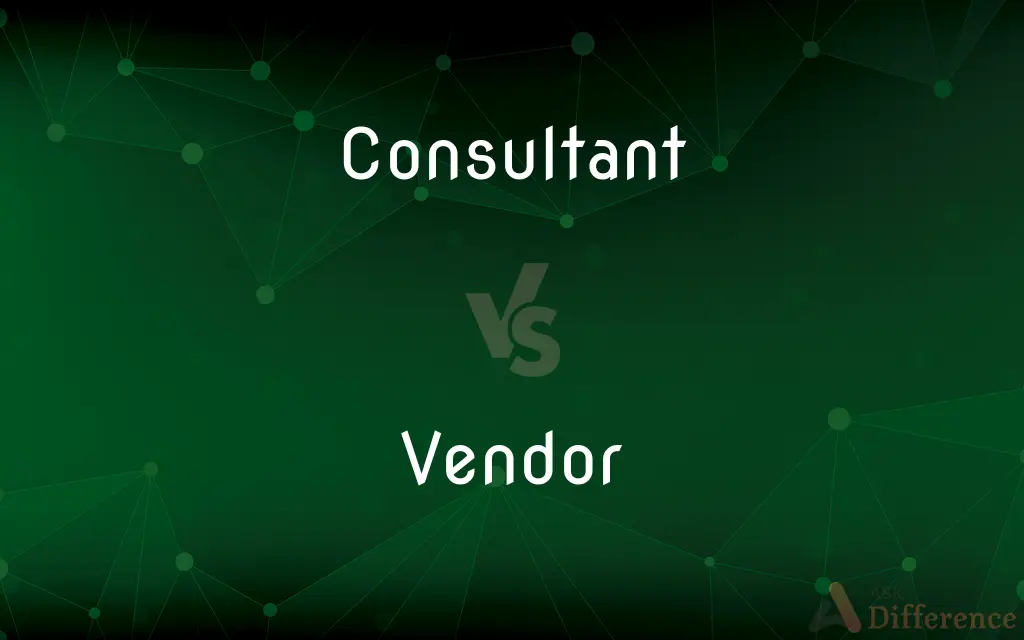Consultant vs. Vendor — What's the Difference?
Edited by Tayyaba Rehman — By Maham Liaqat — Updated on March 8, 2024
A consultant offers expertise and advice in a specific area to solve problems or improve operations, focusing on strategic guidance, whereas a vendor supplies goods or services, emphasizing product delivery and transactions.

Difference Between Consultant and Vendor
Table of Contents
ADVERTISEMENT
Key Differences
Consultants are professionals or firms that provide expert advice in a particular domain, such as management, technology, finance, or law. Their role is to analyze problems, devise strategies, and recommend solutions to improve their clients' operations, efficiency, or profitability. Consultants are often hired for their specialized knowledge and objective insights to address specific challenges or to facilitate change within an organization. On the other hand, vendors are individuals or companies that sell goods or services. They operate within a commercial context, focusing on the production, marketing, and sales of their offerings. Vendors are critical for supplying the necessary resources, products, or services that businesses require for their day-to-day operations.
While consultants focus on providing advice and strategic guidance, vendors are concerned with product quality, availability, and fulfilling customer orders. Consultants engage in a more interactive and collaborative relationship with their clients, working closely to identify and solve problems. In contrast, the relationship between a vendor and a client is transactional, centered around the exchange of goods and services for payment.
Consultants are typically hired on a project basis or for a specific duration to address particular issues or to provide insights into strategic decisions. Their value lies in their ability to bring fresh perspectives, specialized knowledge, and industry best practices to their clients. Vendors, whereas, establish ongoing supply agreements or one-off sales transactions, focusing on delivering products or services that meet predefined specifications and needs.
The selection of a consultant is often based on their expertise, reputation, and the ability to provide customized solutions. In contrast, vendors are chosen based on the quality, price, and reliability of their products or services. This highlights a fundamental difference in how organizations engage with consultants and vendors, reflecting different needs and expectations.
Despite these differences, both consultants and vendors play essential roles in the business ecosystem. Consultants help organizations navigate complex challenges and improve their strategies and operations, while vendors provide the necessary resources and services that enable businesses to function and grow.
ADVERTISEMENT
Comparison Chart
Primary Focus
Providing expert advice and strategic guidance
Supplying goods and services
Relationship
Collaborative and advisory
Transactional
Basis of Selection
Expertise, reputation, ability to customize solutions
Product/service quality, price, reliability
Role in Client Operations
Analyze, strategize, and recommend improvements
Fulfill product or service needs
Engagement Duration
Project-based or specific duration
Ongoing supply or one-off transactions
Compare with Definitions
Consultant
A professional who offers expert advice in a specific area.
The company hired a security consultant to improve their data protection policies.
Vendor
A supplier of products for businesses or consumers.
We sourced our office supplies from a reputable vendor.
Consultant
A specialist in providing objective insights and solutions.
An IT consultant recommended upgrading the company’s software systems.
Vendor
A company or person selling goods or services.
The restaurant’s food vendor supplies fresh produce daily.
Consultant
An expert hired to solve specific problems or improve operations.
A financial consultant advised on cost-reduction strategies.
Vendor
A provider of services needed for business operations.
The cleaning service vendor ensures the office remains spotless.
Consultant
An advisor engaged to facilitate change within an organization.
The HR consultant developed a new talent acquisition strategy.
Vendor
A business that operates in a commercial transaction context.
The vendor at the fair offered a variety of handmade crafts.
Consultant
Someone skilled in analyzing and advising on business strategies.
A management consultant was tasked with streamlining operations.
Vendor
An entity involved in the production and sale of goods.
The software vendor released a new version of its productivity suite.
Consultant
A consultant (from Latin: consultare "to deliberate") is a professional (also known as Expert, Specialist, see variations of meaning below) who provides advice and further purposeful activities in an area of specialization.
Vendor
In a supply chain, a vendor, or a seller, is an enterprise that contributes goods or services. Generally, a supply chain vendor manufactures inventory/stock items and sells them to the next link in the chain.
Consultant
One who gives expert or professional advice.
Vendor
A person or company offering something for sale, especially a trader in the street
An Italian ice-cream vendor
Consultant
One who consults another.
Vendor
One that sells or vends something
A street vendor.
A vendor of software products on the Web.
Consultant
A person or party that is consulted.
Vendor
One that provides products or services to a business for a fee.
Consultant
A person whose occupation is to be consulted for their expertise, advice, service or help in an area or specialty; a party whose business is to be similarly consulted.
Vendor
A vending machine.
Consultant
A senior hospital-based physician or surgeon who has completed all specialist training and has been placed on the specialist register in their chosen speciality, roughly equivalent to an attending physician in North America.
Vendor
A person or a company that vends or sells.
Consultant
An expert who gives advice.
Vendor
A vending machine.
Consultant
An expert who gives advice;
An adviser helped students select their courses
The United States sent military advisors to Guatemala
Vendor
To bundle third-party dependencies with the source code for one's own program.
I distributed my application with a vendored copy of Perl so that it wouldn't use the system copies of Perl where it is installed.
Vendor
As the software vendor, to bundle one's own, possibly modified version of dependencies with a standard program.
Strawberry Perl contains vendored copies of some CPAN modules, designed to allow them to run on Windows.
Vendor
A vender; a seller; the correlative of vendee.
Vendor
Someone who promotes or exchanges goods or services for money
Common Curiosities
What is the main difference between a consultant and a vendor?
The main difference is that a consultant provides expertise and advice to solve problems or improve operations, while a vendor supplies goods or services.
What factors influence the selection of a consultant?
Factors include the consultant's expertise, reputation, and the ability to provide customized, effective solutions.
Can a consultant influence vendor selection?
Yes, consultants may advise on vendor selection based on their analysis and understanding of the client's needs and strategic goals.
How does a vendor manage customer expectations?
Vendors manage customer expectations by ensuring product or service quality, reliability, and by providing excellent customer service.
How do consultants add value to a business?
Consultants add value by offering specialized knowledge, objective insights, and strategic advice to improve business operations and strategies.
How do businesses choose vendors?
Businesses select vendors based on product or service quality, price, reliability, and the vendor’s ability to meet specific needs.
Do consultants work on a long-term basis?
Consultants can be engaged for both short-term projects and long-term advisory roles, depending on the client’s needs.
Can a company be both a consultant and a vendor?
Yes, a company can offer both consultancy services and products, serving dual roles depending on client needs.
Why are vendors important for businesses?
Vendors are crucial for providing the goods and services businesses need to operate, ranging from raw materials to software solutions.
Are vendor relationships always ongoing?
Vendor relationships can be either ongoing, through supply agreements, or one-off, based on specific transactions or projects.
What role does a consultant play in change management?
A consultant helps facilitate change management by providing strategies, planning, and support to implement new processes or improvements effectively.
How can consultants and vendors impact business growth?
Consultants and vendors contribute to business growth by improving operations, strategies, and supplying essential goods and services, respectively.
What is a key consideration when engaging a vendor?
A key consideration is the vendor’s ability to deliver products or services that align with the business’s requirements and quality standards.
How do businesses evaluate the effectiveness of consultants and vendors?
Effectiveness is evaluated based on the consultant’s impact on problem-solving and strategy improvement, and the vendor’s ability to meet product or service expectations.
What challenges might a business face when working with consultants or vendors?
Challenges include ensuring alignment of goals, managing costs, and achieving desired outcomes within set timelines.
Share Your Discovery

Previous Comparison
Cozy vs. Comfy
Next Comparison
Barrel vs. BucketAuthor Spotlight
Written by
Maham LiaqatEdited by
Tayyaba RehmanTayyaba Rehman is a distinguished writer, currently serving as a primary contributor to askdifference.com. As a researcher in semantics and etymology, Tayyaba's passion for the complexity of languages and their distinctions has found a perfect home on the platform. Tayyaba delves into the intricacies of language, distinguishing between commonly confused words and phrases, thereby providing clarity for readers worldwide.















































